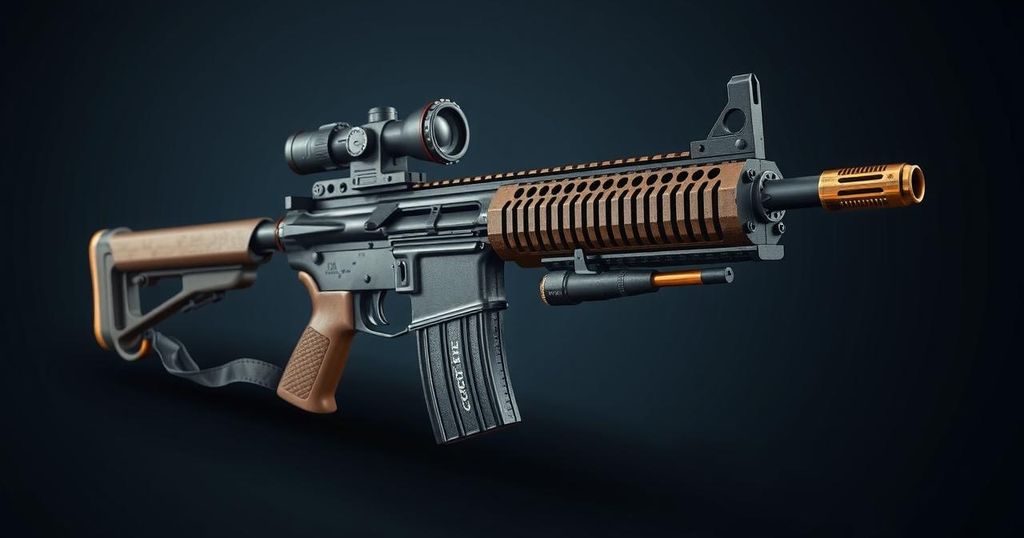Amnesty International Reveals Use of French Weapons in Sudan’s Conflict

An Amnesty International investigation reveals that French-manufactured military technology, specifically the Galix System, is being used by the Rapid Support Forces in Sudan, likely violating the UN arms embargo. The ongoing conflict has resulted in over 23,000 deaths and millions displaced, with calls for immediate cessation of arms supplies. The report stresses the need for enhanced enforcement of arms regulations to protect civilians and uphold human rights.
Amnesty International has conducted an extensive investigation revealing that French-manufactured military technology is currently deployed on the battlefield in Sudan, potentially violating the ongoing UN arms embargo on Darfur. The report highlights the presence of armored personnel carriers (APCs) made in the United Arab Emirates, equipped with the Galix System, a reactive defense technology designed and produced by Lacroix Defense and KNDS France. The Rapid Support Forces (RSF) utilize these APCs, raising serious concerns about compliance with international arms regulations. Amnesty International has called upon France to halt any further exports and has urged the international community to cease arms supplies to all combatants in Sudan, given the escalating human rights violations and the humanitarian crisis in the region. Further investigations have verified the identification of Nimr Ajban APCs in Sudan, which are manufactured in the UAE and outfitted with the Galix System. This technology is engineered to provide protection against various threats and is easily recognizable on the battlefield. Amnesty International’s findings underscore a broader pattern of arms transfers into Sudan despite the existing arms embargo, highlighting the complex interactions between the UAE and French defense sectors, which have facilitated such transactions from 2014 to 2023. Since the outbreak of fighting in April 2023 between the Sudanese Armed Forces (SAF) and RSF, there have been over 23,000 fatalities and significant civilian displacement, with over 11 million people affected. Amnesty International urges the UN Security Council to extend its arms embargo to cover all of Sudan and enhance the mechanisms necessary to monitor compliance and implementation of these critical regulations, emphasizing the role of human rights due diligence in corporate and state behavior. The long-standing military relationship between France and the UAE complicates matters, as both nations have established significant arms trade links over the years. Direct questioning from Amnesty International to Lacroix Defense and associated companies has yet to yield a response, leaving open questions about accountability and adherence to international laws governing arms exports. With the intensifying conflict and humanitarian needs in Sudan, all countries are urged to immediately halt arms supplies to the warring factions, a call echoed by Amnesty’s Secretary General, Agnès Callamard, who underscored the devastating consequences of continued arms flow into the region.
Fighting in Sudan has intensified since April 2023, resulting in significant civilian casualties and displacement. The emergence of a humanitarian crisis, compounded by rampant use of foreign-manufactured weaponry, raises grave concerns regarding international law compliance. The European Union has maintained an arms embargo on Sudan since 1994, yet ongoing military collaborations between French and UAE defense firms threaten the effectiveness of these regulations. Amnesty International’s investigations emphasize the need for immediate international action to curb arms supplies to all parties involved in the conflict to protect civilian lives and uphold humanitarian principles.
The utilization of French-made weapons systems in Sudan poses a serious challenge to existing arms embargos and highlights critical shortfalls in enforcement. Amnesty International’s findings serve as a clarion call for the international community to take decisive action against arms transfers that fuel ongoing violence, particularly in a region plagued by humanitarian crises. Strengthening monitoring mechanisms for arms embargoes and ensuring compliance by all states and companies involved in defense exports is imperative to mitigate further suffering and uphold international law.
Original Source: www.amnesty.org







